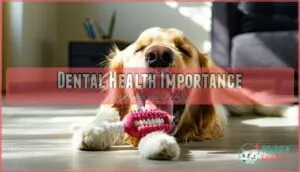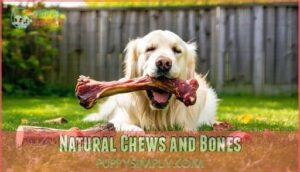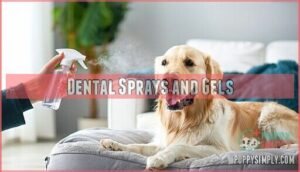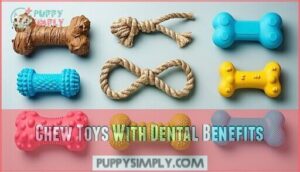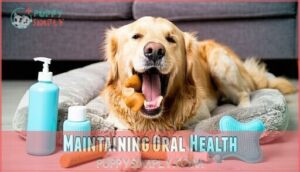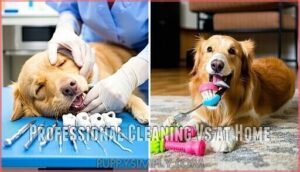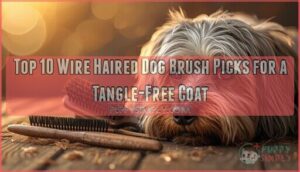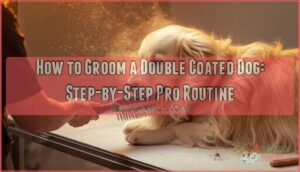This site is supported by our readers. We may earn a commission, at no cost to you, if you purchase through links.
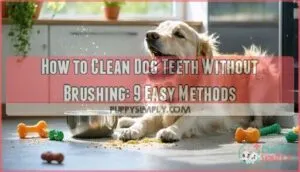
Raw bones, dental treats, and oral sprays provide mechanical cleaning action while being much easier than wrestling with a toothbrush.
These alternatives work by creating friction against the teeth, removing bacteria and freshening breath naturally.
Water additives dissolve into your dog’s drinking water, working continuously throughout the day.
The key is consistency – whatever method you choose needs to become part of your dog’s daily routine for maximum effectiveness.
Table Of Contents
- Key Takeaways
- Dog Teeth Cleaning Methods
- Cleaning Dog Teeth Without Brushing
- Dental Health Importance
- Alternative Dental Cleaning Methods
- Maintaining Oral Health
- Professional Cleaning Vs at Home
- Frequently Asked Questions (FAQs)
- What can I give my Dog to clean his teeth?
- How can I keep my dog’s teeth clean without a toothbrush?
- Can you brush your dog’s teeth without brushing?
- Should you brush your dog’s teeth every day?
- Do I need to brush my puppy’s teeth?
- Can you replace brushing your dog’s teeth with a dog toothbrush?
- How can I clean my dog’s teeth if he won’t let me brush them?
- How do I get my dog’s teeth clean without brushing?
- How do you clean a dog’s teeth naturally?
- What can I give my dog instead of brushing teeth?
- Conclusion
Key Takeaways
- Use dental chews and treats daily – VOHC-approved options can reduce plaque by up to 70% through mechanical scraping action as your dog chews.
- Add water additives to their drinking bowl – These dissolve invisibly and work continuously throughout the day to break down bacteria and freshen breath.
- Provide dental toys and raw bones – Textured surfaces and natural bones create friction that removes plaque buildup while your dog plays and chews.
- Stay consistent with your chosen method – Whatever alternative you pick needs to become part of your dog’s daily routine for maximum effectiveness in preventing dental disease.
Dog Teeth Cleaning Methods
Your dog’s dental health doesn’t have to depend on wrestling with a toothbrush.
There are several effective alternatives that can keep your pet’s teeth clean and breath fresh without the daily battle of brushing.
Dental Chews and Treats
Dental chews and treats offer a convenient solution for busy pet owners seeking effective dog teeth cleaning alternatives.
These specially formulated products reduce plaque by nearly 70% when used daily.
Look for VOHC-approved dental chews that match your dog’s chew size and frequency needs.
Quality chew ingredients guarantee both chew safety and chew effectiveness for superior oral health.
Some chews even have the <strong>VOHC seal</strong>, indicating high quality.
Dental Toys and Bones
Interactive toys keep your dog’s teeth clean through natural chewing action.
Dental toys with textured surfaces remove plaque buildup by up to 70%, while rubber and rope toys provide mechanical abrasion.
Choose toys that indent slightly with your fingernail to prevent tooth damage.
Toys made of natural latex rubber are also a good choice because they gently remove plaque.
Power chewer toys with ridges and nubs work best for aggressive chewers, lasting weeks while promoting gum health.
Dental Powders and Water Additives
Beyond physical cleaning tools, you can sprinkle dental powders into your dog’s meals or add water additives to their bowl.
These natural supplements work behind the scenes to reduce plaque and freshen breath. Powder effectiveness varies, but many contain enzymes that break down bacteria.
Additive safety is generally high, though some dogs may experience stomach upset. High-quality kibble also provides veggie cleaning benefits through its abrasive texture.
Untreated plaque can harden, leading to periodontal liver issues, which is a serious health concern.
Cleaning Dog Teeth Without Brushing
While brushing remains the gold standard, plenty of no brush teeth cleaning options exist for your furry friend.
These alternative teeth cleaning methods work through mechanical action, natural ingredients, or dietary changes. DIY dental care doesn’t have to be complicated, and many dogs actually prefer these dog teeth cleaning methods over traditional brushing.
Senior dog care often requires gentler approaches, while puppy dental care can start with softer alternatives. Understanding breed predisposition helps you choose the most effective natural dog teeth cleaning approach for your specific dog.
- Dental chews scraping away tartar as your dog gnaws contentedly on the couch
- Water additives invisibly working while your pup drinks from their favorite bowl
- Raw bones naturally polishing teeth during an afternoon backyard session
- Coconut oil treats melting on the tongue while providing antimicrobial benefits
- Crunchy vegetables creating mechanical friction against plaque buildup during mealtime
Dental Health Importance
Your dog’s dental health directly impacts their overall well-being, with 80% of dogs showing signs of dental disease by age three.
Poor oral hygiene can lead to painful infections, tooth loss, and bacteria entering the bloodstream that affects the heart, kidneys, and liver, highlighting the importance of oral hygiene.
Signs of Dental Disease
Your dog’s mouth can reveal serious health issues before they become costly problems.
Watch for bad breath in dogs, which signals bacterial buildup and potential gum disease. Swollen gums appear red and inflamed, while excessive drooling may indicate pain.
Chewing difficulty suggests discomfort, and facial swelling indicates advanced periodontal disease requiring immediate veterinary attention.
Regular cleanings can address hidden dental issues not visible at home, which helps prevent bad breath and gum disease.
Consequences of Poor Dental Health
Poor dental health creates a domino effect that extends far beyond your dog’s mouth.
Poor dental health doesn’t stop at your dog’s mouth—it spreads throughout their entire body.
When harmful bacteria from periodontal disease enter the bloodstream, they can trigger serious complications throughout your pet’s body.
The consequences of neglecting your dog’s oral health include:
- Systemic Infections – Bad breath in dogs often signals bacteria spreading to essential organs, causing heart problems, kidney damage, and liver issues
- Painful Infections – Untreated plaque removal for dogs becomes increasingly difficult as tartar control for dogs fails, leading to abscesses and tooth loss
- Chronic Pain – Advanced dog dental issues make eating uncomfortable, reducing your pet’s quality of life and nutritional intake
Benefits of Regular Dental Care
Regular dog dental care creates a domino effect of health benefits that ripple throughout your pet’s entire body.
When you maintain your dog’s oral hygiene, you’re investing in their overall well-being and your wallet’s health too.
| Benefit | Impact |
|---|---|
| Overall Health | Prevents bacteria from entering bloodstream, protecting heart, liver, and kidneys |
| Pain Prevention | Eliminates tooth pain and gum inflammation that makes eating uncomfortable |
| Cost Savings | Avoids expensive emergency procedures and extractions ranging $300-$1,000 |
| Disease Prevention | Reduces risk of periodontal disease by up to 85% with consistent care |
| Senior Dogs | Maintains quality of life as aging dogs face increased dental vulnerabilities |
Proper dog dental care means your furry friend can enjoy meals without wincing, and you’ll notice fresher breath during those morning cuddles.
Plaque removal for dogs and tartar control for dogs through regular maintenance prevents the painful infections that often require surgical intervention.
Your dog’s oral health directly impacts their energy levels, appetite, and overall happiness – making consistent dental care one of the most valuable investments in their long-term wellness.
Alternative Dental Cleaning Methods
If you’re looking for ways to keep your dog’s teeth clean without the daily brushing battle, you’ve got several effective options at your disposal.
From natural chews that work while your pup plays to dental sprays that take seconds to apply, these alternative methods can make oral care much easier for both of you, using natural approaches.
Natural Chews and Bones
Natural chews like raw bones and bully sticks offer powerful dental cleaning through abrasive action.
Raw bones reduce tartar by up to 87% within weeks, while bully sticks cut oral bacteria by 60%.
Choose appropriately sized dental chews for dogs based on chewing intensity, and source bones from trusted butchers, ensuring they’re uncooked to prevent splintering.
Antler chews provide ethical, long-lasting options when naturally shed.
Dental Sprays and Gels
Through application of dental sprays and gels, you’ll make plaque prevention effortless for your furry friend.
These dog dental spray alternatives offer convenient breath freshening without the wrestling match of traditional brushing methods. Many owners find dog dental sprays a convenient option.
- Instant freshness – Transform stinky dog breath into minty sweetness with just a few spritzes
- Hassle-free application – No more chasing your dog around the house with a toothbrush
- Gentle yet effective – Gels and sprays work quietly to break down harmful bacteria
- Ingredient safety – Quality formulations use dog-safe components that won’t upset sensitive stomachs
- Quick results – See improved oral health within days of consistent use
Chew Toys With Dental Benefits
Chew toys with dental benefits come in various textures and materials designed to scrape plaque while entertaining your dog.
Look for toys with ridges, bumps, or rope fibers that provide mechanical cleaning action. Choose appropriate toy size matters for your dog’s breed and supervise play sessions.
Power chewer toys made from durable nylon or natural rubber work best for aggressive chewers, while softer options suit gentler dogs chewing habits.
Some toys even have the VOHC seal of acceptance, indicating proven effectiveness.
Maintaining Oral Health
You can maintain your dog’s oral health without brushing by combining multiple cleaning methods that work together.
Regular use of dental chews, water additives, and appropriate toys creates a thorough routine that prevents plaque buildup and keeps your pet’s mouth healthy.
Oral Health Maintenance
How do you maintain your dog’s oral health beyond basic cleaning? Consistent care makes all the difference in preventing dental disease.
- Dietary Impact – Choose kibble that mechanically scrapes teeth and supports gum health through added vitamins
- Hydration Matters – Fresh water promotes saliva production, naturally washing away bacteria and food particles
- Gum Massage – Regular chewing stimulates blood flow to gums, strengthening tissue against periodontal disease
- Breed Predisposition – Monitor smaller breeds more closely, as they’re genetically prone to faster plaque buildup
Untreated plaque can lead to periodontal disease, affecting overall health.
Fresh Breath and Tartar Removal
Bad breath in dogs often stems from bacteria buildup that dental chews can tackle effectively.
Natural remedies like coconut oil work as breath fresheners while supporting tartar prevention.
Regular dog dental care using teeth cleaning without toothbrush methods helps with tartar removal and plaque removal.
| Method | Effectiveness |
|---|---|
| Dental chews | 70% plaque reduction |
| Water additives | Daily breath freshening |
| Natural bones | Mechanical tartar removal |
| Coconut oil | Antimicrobial properties |
Preventing Dental Diseases
Prevention beats treatment in the context of dog dental diseases.
Early intervention matters most for small breeds with breed predisposition to dental issues.
Your dog’s diet impact extends beyond nutrition – crunchy kibble naturally scrapes plaque while soft foods stick to teeth.
Proper hydration effects include washing away bacteria and food particles.
Focus on gum health through regular preventive dental care to avoid costly professional treatments later, as prevention beats treatment and early intervention matters most.
Professional Cleaning Vs at Home
Professional dental cleanings at your vet offer deep cleaning under anesthesia but cost $300-$1,000.
While at-home methods like dental chews and toys provide daily maintenance for a fraction of the price.
You’ll need to weigh the thoroughness of professional care against the convenience and affordability of home alternatives.
Cost Comparison
Professional cleaning averages $376 annually but can reach $2,000 with extractions. At-home alternatives cost $120-$480 yearly, offering significant long-term savings.
Chews vs. toys provide different price points, while powder vs. water additives vary in cost-effectiveness for dog dental cleaning.
| Method | Annual Cost | Best For |
|---|---|---|
| Professional Cleaning | $300-$2,000 | Advanced dental issues |
| DIY Alternatives | $120-$480 | Preventive maintenance |
| Hybrid Approach | $400-$800 | Ideal oral health |
The annual cost of these methods can significantly impact the decision, with professional cleaning being the most expensive option, and DIY alternatives offering the most significant long-term savings.
Anesthesia-Free Cleaning
Anesthesia-free cleaning offers a gentler approach for older dogs who can’t handle traditional sedation.
However, this method only addresses visible tartar above the gumline, missing critical areas where disease develops. The technique requires skilled restraint and specialized training.
| Pros | Cons |
|---|---|
| No anesthesia risks | Limited effectiveness below gumline |
| Lower cost option | Can’t detect hidden problems |
| Quick recovery time | May create false security |
| Suitable for senior dogs | Requires cooperative pets |
While these brushing alternatives seem appealing, the Effectiveness Debate continues among veterinarians.
Safety Concerns include potential stress and incomplete cleaning that could delay necessary treatment.
Effectiveness of Different Methods
Different dog teeth cleaning alternatives show varying effectiveness levels. Professional cleaning achieves the deepest results, while at-home methods offer maintenance benefits.
Here’s how they compare:
| Method | Plaque Reduction | Best For |
|---|---|---|
| Dental chews | 12-17% reduction | Daily maintenance |
| Dental toys | Moderate abrasion | Mechanical cleaning |
| Water additives | 40%+ prevention | Easy incorporation |
Chew effectiveness depends on VOHC approval, while powder absorption varies by ingredient quality. Toy abrasion works best on exposed surfaces, and additive efficacy requires consistent use. Bone benefits include natural tartar removal, though enzymatic toothpaste alternatives can’t match professional scaling for advanced disease.
Frequently Asked Questions (FAQs)
What can I give my Dog to clean his teeth?
You can give your dog dental chews, raw bones, dental toys, or dental powder mixed into meals.
These alternatives help scrape plaque, massage gums, and freshen breath naturally without requiring brushing.
How can I keep my dog’s teeth clean without a toothbrush?
You’ll find plenty of ways to keep your dog’s teeth sparkling clean without wrestling with a toothbrush. Try dental chews, water additives, or raw bones for natural cleaning action.
Can you brush your dog’s teeth without brushing?
Yes, you can maintain your dog’s dental health without traditional brushing through dental chews, toys, water additives, and raw bones that mechanically remove plaque and tartar buildup.
Should you brush your dog’s teeth every day?
Daily brushing is ideal for your dog’s dental health, but it’s not absolutely necessary.
You can brush every other day or three times weekly and still maintain good oral hygiene with consistent care.
Do I need to brush my puppy’s teeth?
Puppies don’t need daily brushing initially, but you should start handling their mouth early to build tolerance.
Begin gentle tooth brushing around 12-16 weeks when adult teeth emerge to prevent future dental issues.
Can you replace brushing your dog’s teeth with a dog toothbrush?
Eighty percent of dogs show dental issues by age three.
But you can’t replace proper brushing with just a dog toothbrush alone—you need toothpaste and proper technique for effective cleaning.
How can I clean my dog’s teeth if he won’t let me brush them?
Try dental chews, water additives, or dental toys instead. These alternatives help remove plaque and tartar while being more tolerable for reluctant dogs than traditional brushing methods.
How do I get my dog’s teeth clean without brushing?
Dental chews, water additives, and raw bones offer effective alternatives.
Choose VOHC-certified dental treats, add flavorless water supplements, or provide supervised raw bones to naturally scrape away plaque and tartar buildup, using methods that are naturally effective.
How do you clean a dog’s teeth naturally?
Feed your dog raw bones, dental chews, and firm vegetables like carrots.
Add coconut oil to meals for antimicrobial benefits.
Use dental water additives or sprinkle seaweed-based powder on food to naturally soften plaque.
What can I give my dog instead of brushing teeth?
Studies show 80% of dogs develop dental disease by age three, making alternatives to brushing essential.
You can offer dental chews, raw bones, dental toys, or water additives to maintain your dog’s oral health effectively, with dental disease being a key concern.
Conclusion
An ounce of prevention is worth a pound of cure regarding your dog’s dental health.
Learning how to clean dog teeth without brushing doesn’t have to be complicated or stressful. You’ve got numerous effective alternatives that’ll keep your pup’s mouth healthy and fresh.
Whether you choose dental chews, water additives, or natural bones, consistency remains your key to success.
Your furry friend will thank you for making their dental care routine enjoyable rather than a daily battle with the help of prevention.
- https://www.ipsos.com/en-ca/news-polls/most-95-pet-owners-brush-their-own-teeth-daily-few-brush-their-dogs-8-or-cats-4-teeth-daily-basis
- https://vetmedbiosci.colostate.edu/vth/animal-health/keeping-your-pets-teeth-clean-is-important-to-their-overall-health/
- https://pangovet.com/pet-lifestyle/dogs/petlab-co-probright-review/
- https://www.petmd.com/dog/nutrition/coconut-oil-dogs-understanding-benefits-and-risks
- https://www.akc.org/expert-advice/health/keep-dog-teeth-clean/

